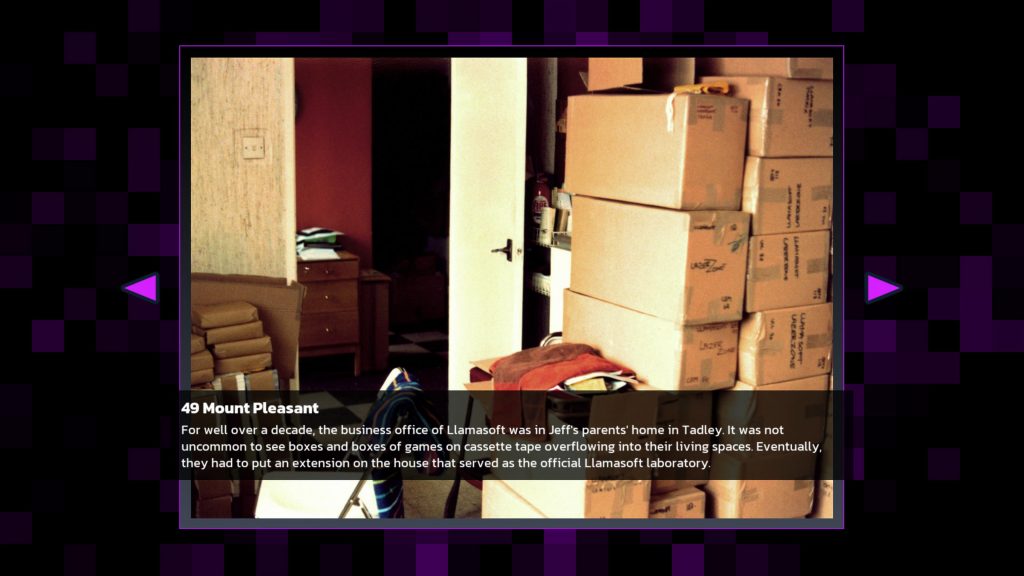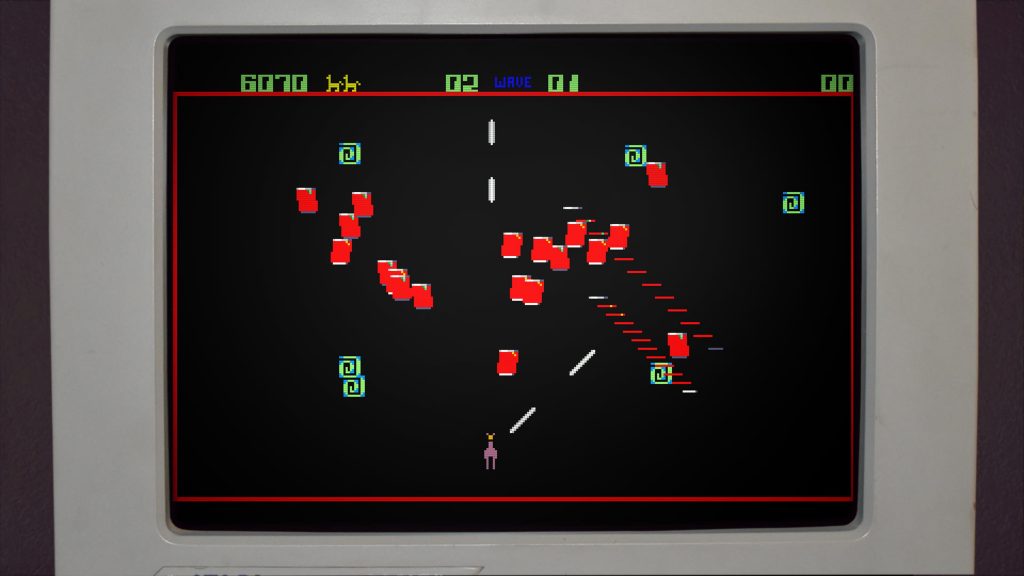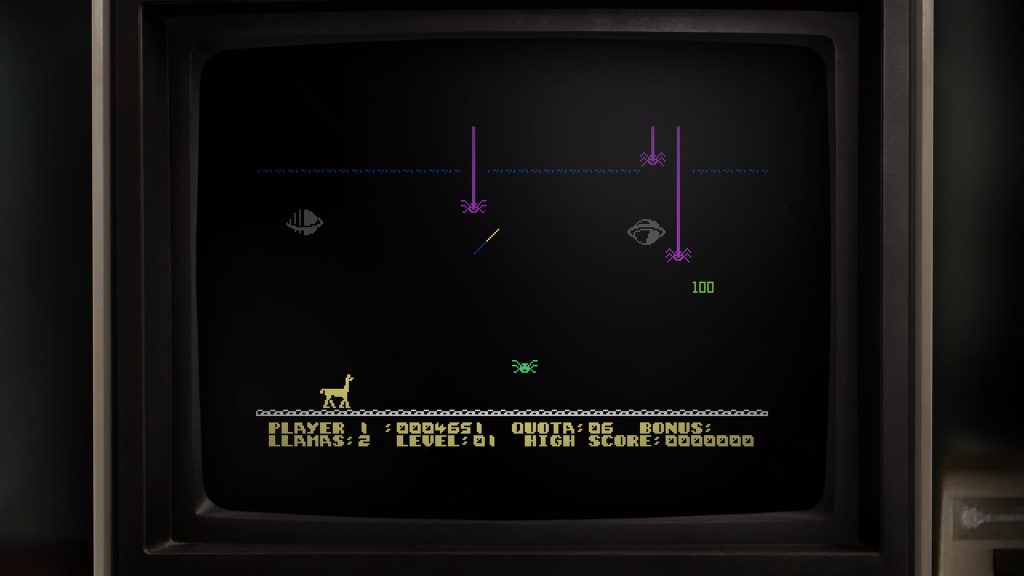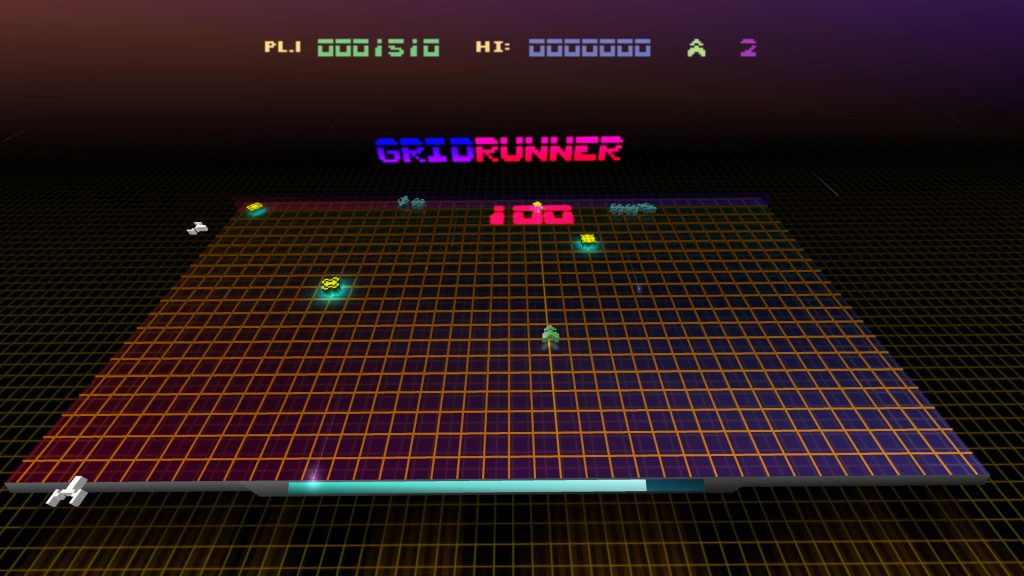Digital Eclipse are showing themselves to be masterful at collating and preserving the games and stories from our industry. The second in the Gold Master Series, Llamasoft: The Jeff Minter Story focuses on the hairy visionary and mostly focuses on his prolific output during the 1980s. As a lad that owned a couple of machines from that era, it pleases me to see this time period given some well-needed attention. Unfortunately, this collection stops short of showing a more complete picture, particularly when it comes to Llamasoft’s more up-to-date works.
 The timeline begins with Jeff’s fledgling efforts on the ZX80. He’s always had a penchant for replicating existing arcade experiences, but these early attempts are quite quaint. His version of Centipede seems very basic but the core of the experience is there. 3D3D is his take on a maze game where there is no threat beyond your own poor sense of direction. You get a sense throughout that he simply adores the arcade mindset and the games that can produce.
The timeline begins with Jeff’s fledgling efforts on the ZX80. He’s always had a penchant for replicating existing arcade experiences, but these early attempts are quite quaint. His version of Centipede seems very basic but the core of the experience is there. 3D3D is his take on a maze game where there is no threat beyond your own poor sense of direction. You get a sense throughout that he simply adores the arcade mindset and the games that can produce.
They’re not all winners but, if you’re going to catalogue a person’s body of work, you need those there with the proper context. I feel like Llamasoft: The Jeff Minter Story does a wonderful job of providing that. His passion shines through his games and you can see him revisit and tweak concepts to create sequels or new versions as time goes on. His 80’s works represent a real journey in experimentation and inpiration.
 We do get sprinklings of Minter the man. There’s a lot less footage available, possibly due to the upcoming Heart of Neon documentary. Jeff will supply his opinion on tea, the virtue of farmyard animals and rural living but those glimpses are a little less illuminating. Indeed, there’s more talk coming from his contemporaries, at times. Minter has plenty more to give in text, particularly his Zzap64 columns which have been meticulously scanned. His newsletters are there, too but these all provide insight of a professional level.
We do get sprinklings of Minter the man. There’s a lot less footage available, possibly due to the upcoming Heart of Neon documentary. Jeff will supply his opinion on tea, the virtue of farmyard animals and rural living but those glimpses are a little less illuminating. Indeed, there’s more talk coming from his contemporaries, at times. Minter has plenty more to give in text, particularly his Zzap64 columns which have been meticulously scanned. His newsletters are there, too but these all provide insight of a professional level.
It is fascinating to hear about how Llamasoft operated from the family home. His mother becoming a key part in managing and producing marketing material. Given the stories I’ve heard of bedroom coders over the years, this is heart-warming and draws similar parallels to The Making of Karateka and how Jordan and Francis Mechner supported each other. There’s mentions of his US distributor going bust, as well as the high of those early chart successes.
We get design documents, a lot of art from Steinar Lund and magazine advertisements. These are fascinating in their own way and it goes to show just how prolific Jeff was during the 80’s. Curiosities like Colourspace and Psychedelia allow him a chance to wax lyrical about the joy of light synthesizers. It’s one of his passions I knew about but it’s nice to hear him talk about them with great affection. It makes me want to dig out the Xbox 360 and play with Neon.
 I think the collection really hits it stride once that Llamasoft in-house aesthetic is found. Even when he’s not being trippy, his ideas often lead to surreal outcomes. Hover Bovver sounds mundane on paper but there’s a cheeky humour and a solid execution that leads to something that is distinctly his. When he is venturing back into arcade homages, the animal motifs and peculiar enemy designs lead to something that does not feel like blatant copycatting. It feels lovingly earnest. Often he’ll add his own gameplay elements and he talks about how the difficulty ramp is a tough nut to crack.
I think the collection really hits it stride once that Llamasoft in-house aesthetic is found. Even when he’s not being trippy, his ideas often lead to surreal outcomes. Hover Bovver sounds mundane on paper but there’s a cheeky humour and a solid execution that leads to something that is distinctly his. When he is venturing back into arcade homages, the animal motifs and peculiar enemy designs lead to something that does not feel like blatant copycatting. It feels lovingly earnest. Often he’ll add his own gameplay elements and he talks about how the difficulty ramp is a tough nut to crack.
It’s a shame the timeline does seem to briskly belt through the 90’s. They were less productive times of Llamasoft with distributors becoming harder to find and games just requiring more time to create. The bedroom coder was suddenly being overshadowed by teams of people. Solo operations required cooperation and, whilst there was some success with shareware releases like Llamatron: 2112, his renaissance arguably comes with the assistance of Atari.
Jeff Minter loves Tempest and he’s arguably the grand master of bringing that specific tube shooter up through the ages. The offering of games ends with Tempest 2000, arguably the most accomplished game within the collection. I would consider that the inflection point for Llamasoft’s more modern experiences but I would’ve loved to see games well into the current millennium. I know those games are still for sale and rights holders can make including those games a potential headache. Still, I’d have considered that a hassle worth undertaking. There is an updated version of Gridrunner but, aside from a graphical overhaul and tilted perspective, it is faithful to the original.
 Certainly that would help round out the games list and really cement where Llamasoft is now at as a two-person operation. There is more an emphasis on sensory bombardment and overwhelming the player. Jeff calls it a chance to get the players into a zone. Including these missing pieces would’ve given an opportunity to hear about the challenges of developing within the 21st century.
Certainly that would help round out the games list and really cement where Llamasoft is now at as a two-person operation. There is more an emphasis on sensory bombardment and overwhelming the player. Jeff calls it a chance to get the players into a zone. Including these missing pieces would’ve given an opportunity to hear about the challenges of developing within the 21st century.
As it stands, I feel like Llamasoft: The Jeff Minter Story is an extensive delivery of his prolific 80’s heyday. It gives people a chance to revisit computing memories that maybe haven’t been possible beyond emulation. Sure, this collection is emulation but it’s done in a capacity and with the additional context that makes it feel more substantial. I do wish there was more focus on Minter outside of his professional work and the post-80’s selection is quite meagre. I would still recommend this to anyone curious. Even the chance to see ZX80 for Vic-20 games for the first time in decades has been interesting to me. It has also made me interested to seek the missing pieces out. In that sense, it does a good job of inciting curiosity.
+ The magazine columns and newsletters are great to read.
+ Showcases the surreal and psychedelic aspects of his output very well.
+ A fascinating look into that home computer scene of the era.
- Very little relates to Llamsoft's 21st century games.
- Not a lot of video interviews from the man himself.
- Not all of the games are that worth playing.

